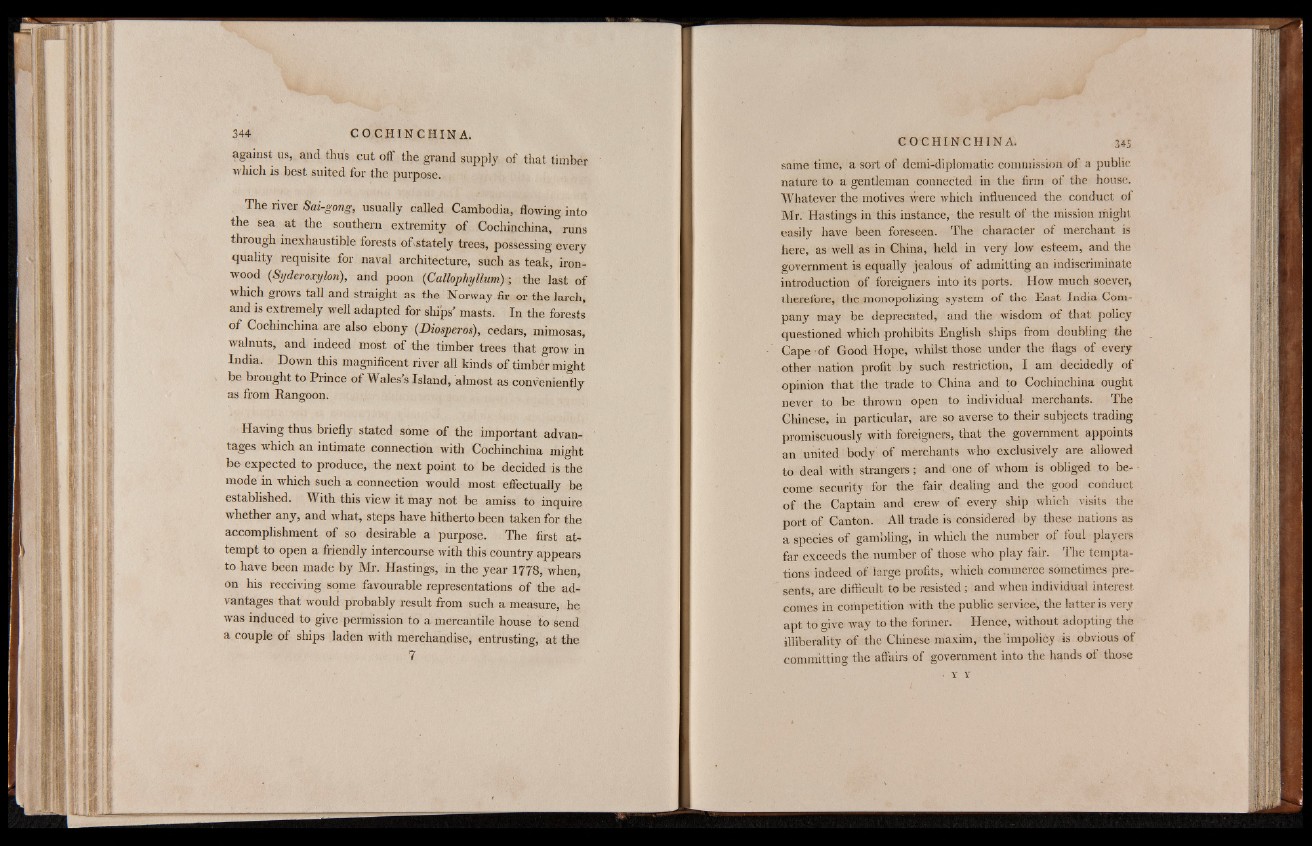
against us, and thus cut off the grand supply of that timber
which is best suited for the purpose.
The river Sai-gotig, usually called Cambodia, flowing into
the sea a t the southern extremity of Cochinchina, runs
through inexhaustible forests ohstately trees, possessing every
quality requisite for naval architecture, such as teak, iron-
wood (,Syderoxylon), and poon (iCallophyllum); the last of
which grows tall and straight as the Norway fir or the larch,
and is extremely well adapted for ships’ masts. In the forests
of Cochinchina are also ebony (Diosperos), cedars, mimosas,
walnuts, and indeed most of the timber trees that grow in
India. Down this magnificent river all kinds of timber might
be brought to Prince of Wales’s Island, almost as conveniently
as from Rangoon.
Having thus briefly stated some of the important advantages
which an intimate connection with Cochinchina might
be expected to produce, the next point to be decided is the
mode in which such a connection would most effectually be
established. With this view it may not be amiss to inquire
whether any, and what, steps have hitherto been taken for the
accomplishment of so desirable a purpose. The first attempt
to open a friendly intercourse with this country appears
to have been made by Mr. Hastings, in the year 1778, when,
on his receiving some favourable representations of the advantages
that would probably result from such a measure, he
was induced to give permission to a mercantile house to send
a couple of ships laden with merchandise, entrusting, at the
7
same time, a sort of demi-diplomatic commission of a public
nature to a gentleman connected in the, firm of the house.
Whatever the motives were which influenced the conduct of
Mr. Hastings in this instance, the result of the mission might
easily have been foreseen. The character of merchant is
here, as well as in China, held in very low esteem, and the
government is equally jealous of admitting an indiscriminate
introduction of foreigners into its ports. How much soever,
therefore, the monopolizing system of the East India Company
may be deprecated, and the wisdom of that policy
questioned which prohibits English ships from doubling the
Cape of Good Hope, whilst those under the flags of every
other nation profit by such restriction, I am decidedly of
opinion that the trade to China and to Cochinchina ought
never to be thrown open to individual merchants. The
Chinese, in particular, are so averse to their subjects trading
promiscuously with foreigners, that the government appoints
an united body of merchants who exclusively are allowed
to deal with strangers; and one of whom is obliged to become
security for the fair dealing and the good conduct
of the Captain and crew of every ship which visits the
port of Canton. All trade is considered by these nations as
a species of gambling, in which the number of foul players
far exceeds the number of those who play fair. The temptations
indeed of large profits, which commerce sometimes presents,
are difficult to be resisted ; and when individual interest
comes in competition with the public service, the latter is very
apt to give way to the former. Hence, without adopting the
illiberality of the Chinese maxim, the impolicy is obvious of
committing the affairs of government into the hands of those
. Y Y